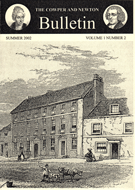‘How are anyone’s interests served if Privy Councillors can openly flout the Official Secrets Act? Why should anyone keep the law if ministers do not?’ I came across this in a recent editorial in one of the broadsheets in connection with Clare Short’s transgression of the normal rules of Cabinet confidentiality. It brought to mind a passage from Cowper’s poem The Task, Book II, ‘The Timepiece’, lines 667-696, which concludes: ….vouchsafing this their sole excuse,Since all are selfish, why not they? I have found this part of his long poem a useful corrective to my long-held assumption that Cowper was a ‘Nature poet’ who occasionally and harmlessly strayed into contemporary social issues, and for whom religion was a tiresome obsession which critics could dismiss, if they wished, as a neurotic symptom. In this section of The Task, however, we find a mood far more astringent, indeed a polemic of which a modern reforming politician would not be ashamed. I confess to being startled when I came across it. It draws attention to the perils of the wider consequences of consumerism in a manner which makes our own commentators sound mealy-mouthed and shallow. Cowper’s shafts are well-directed and unsettling to our age. Try this for a wake-up call: Now basket up the family of plagues That waste our vitals. Peculation, sale Of honour, perjury, corruption, frauds By forgery, by subterfuge of law, By tricks and lies as num’rous and as keen As the necessities their authors feel… Cowper uses the word ‘Profusion’ to cover what we today call ‘excess’ or more often ‘materialism’, with its overtones of conspicuous consumption and greed. …. Profusion is the sire, Profusion unrestrained, with all that’s base In character has littered, all the land… A people such as never was till now. This brings him to the responsibility of advertisers and the pushers of unasked-for products, whose wiles result in widespread debt. And in this passage we even get a foretaste of the ‘rat-race’: ‘makes men mere vermin’! It is a hungry vice: – it eats up all That gives society its beauty, strength Convenience, and security, and use. Makes men mere vermin, worthy to be trapped And gibbetted as fast as bailiff claws Can seize the slipp’ry prey. The next two lines point to the disruption of society as a result of economic pressures. I suspect that trades unionists, social workers and marriage counsellors would nod wisely if they came across this passage. [Profusion] Unties the knot Of union, and converts the sacred band That holds mankind together to a scourge. Then consumerism bears the full weight of Cowper’s ire, not only for the effects he has already referred to, but because of the demands it makes on government and the pressure on politicians to satisfy the public’s expectations of ever-rising standards of living. Profusion deluging a state with lusts Of grossest nature and of worst effects, Prepare it for its ruin. Our ‘gentle’ poet ends this acerbic critique of the society of his day – redolent as it is of our contemporary concerns – with this devastating attack on ‘public men’, leaders of government and communities. It seems very clear that ‘spin’ is not a new phenomenon of the twenty-first century! …. Hardens, blinds, And warps the consciences of public men Till they can laugh at virtue; mock the fools That trust them; and in th’end, disclose a face That would have shocked credulity herself Unmask’d… So the conclusion follows with which this article began …. vouchsafing this their sole excuse, Since all alike are selfish, why not they? This goes far beyond mere moralising. It asks to be taken seriously by more than preachers. The poem goes on to pinpoint as a cause of society’s ailments the lack of discipline and respect in colleges. But that is another story… Keith Arnold
‘How are anyone’s interests served if Privy Councillors can openly flout the Official Secrets Act? Why should anyone keep the law if ministers do not?’ I came across this in a recent editorial in one of the broadsheets in connection with Clare Short’s transgression of the normal rules of Cabinet confidentiality. It brought to mind a passage from Cowper’s poem The Task, Book II, ‘The Timepiece’, lines 667-696, which concludes: ….vouchsafing this their sole excuse,Since all are selfish, why not they? I have found this part of his long poem a useful corrective to my long-held assumption that Cowper was a ‘Nature poet’ who occasionally and harmlessly strayed into contemporary social issues, and for whom religion was a tiresome obsession which critics could dismiss, if they wished, as a neurotic symptom. In this section of The Task, however, we find a mood far more astringent, indeed a polemic of which a modern reforming politician would not be ashamed. I confess to being startled when I came across it. It draws attention to the perils of the wider consequences of consumerism in a manner which makes our own commentators sound mealy-mouthed and shallow. Cowper’s shafts are well-directed and unsettling to our age. Try this for a wake-up call: Now basket up the family of plagues That waste our vitals. Peculation, sale Of honour, perjury, corruption, frauds By forgery, by subterfuge of law, By tricks and lies as num’rous and as keen As the necessities their authors feel… Cowper uses the word ‘Profusion’ to cover what we today call ‘excess’ or more often ‘materialism’, with its overtones of conspicuous consumption and greed. …. Profusion is the sire, Profusion unrestrained, with all that’s base In character has littered, all the land… A people such as never was till now. This brings him to

